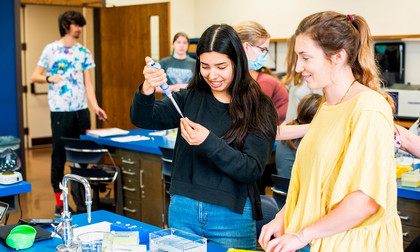The Louis Stokes Alliances for Minority Participation grant will support undergraduate student researchers belonging to underrepresented populations in their path to earning a degree in a STEM discipline.
The end goal of the grant: to increase representation in the STEM workforce in Kansas and Nebraska.
The grant will bring almost $443,000 to Pitt State across five years to support STEM student recruitment and retention.

For each of the 15 students participating at Pitt State each year, it will mean a stipend between $2,000 and $2,500 per year, based on the number of credit hours they take, for a total of around $9,000 during their time here.
That stipend will support what Pitt State program coordinator Christine Brodsky, chair of the Biology Department, called “By Doing Learn opportunities with faculty research mentors,” referring to the university’s unofficial motto of providing engaging hands-on projects for students as they progress toward their degree.
Nearly 25 faculty members in a variety of academic programs, including in Biology, Chemistry, Math and Physics, HHPR, Psychology, School of Automotive and Engineering Technology, have signed up to be mentors.
Student research projects will depend on student interests.
“In Year 1, they will do a trial or pilot project and see how the results pan out, then modify it if necessary as they continue,” Brodsky said.
KU will serve as the primary institution, with Pitt State, the University of Nebraska-Lincoln, Johnson County Community College, Kansas City Kansas Community College, and Southeast Community College in Lincoln making up the ASTER Alliance (Aligning STEM Trainees for Enterprising Research).
Through this alliance, students will be better prepared to transfer from 2-year institutions, matriculate into 4-year institutions, pursue graduate STEM degrees, and contribute to a diverse STEM workforce.
High-impact activities will include:
“They'll gain professional, academic, and social skills to prepare them for coursework and post-graduate career success,” Brodsky said.
The ASTER alliance also will create pathways between the 2- and 4-year higher education institutions to better prepare URM students for degree completion and careers in academia, industry, and government.
“We’re recruiting students now,” Brodsky said, “and we’re planning transition camps for next summer for our transfer scholars to stay in residence halls, work with faculty mentors, explore our labs, and have some research opportunities.”
In addition to a stipend, each student also will be awarded $100 per year toward research supplies. And, the grant will cover their costs for taking the GRE and any living expenses associated with unpaid summer internships.
Students with an interest can contact Brodsky for details or apply online at pittstate.edu/lsamp